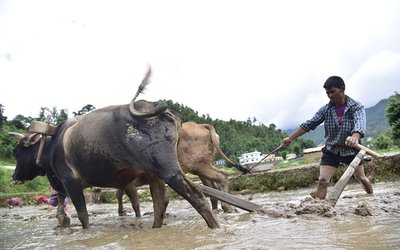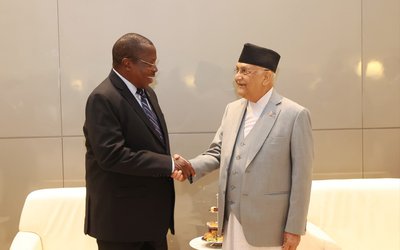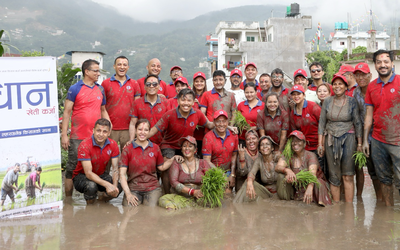More on National






Narendra Bahadur Saud, a resident of Bhatakot Village Development Committee of Achham District, 700 kilometers west of capital Kathmandu, has reason to rejoice.
After receiving support from Practical Action and Alternative Energy Promotion Center, entrepreneurs like Saud, whose business was badly hurt by irregular supply of energy from micro-hydro, have now received regular electricity supply increasing the production of Nepali paper.
“With the completion of up-gradation of micro-hydro, we receive regular electricity even to operate the drier machine,” said Saud.
With the improvement of Kakchepu Khola Micro-hydro,Surya Bahadur Khatri, a resident of Jyakhu VDC of DolkhaDistrict, enhanced the capacity of his dairy. Khatri is not the sole beneficiary from the improvement, the interrupted supply of electricity has encouraged the villagers to get involved in small scale industries.
“After the improvement, the supply of electricity has increased to up to 316 households from 216,” said Khatri. “After the supply of regular power, the numbers of oil seeds, thresher mills and grinding mills have drastically increased.”
The improvement of transmission line from two phases to three phases has made the energy supply by Chhetang micro-hydro viable to operate medium cottage industries. “Our competitive capacity has increased now,” said Suk Bahadur Ranabhat.
These are a few examples. Under Energizing Sustainable Rural Livelihood, 36 micro-hydro projects have become sustainable.
The objective of the project is to ensure sustainability of Micro-Hydro Plants through increased energy utilization by enterprises that enhanced rural livelihoods. The project is also supporting market development of Micro-Hydro and rural energy based enterprises through adopting Participatory Market System Development (PMSD) approach. Developed by Practical Action, the approach is for inclusive market that reduces poverty on a large scale and protects the environment.
According to Practical Action, PMSD is based on three broad principles participation, systems thinking and function. It evolved with the frameworks of value chain development and making market more for the Poor.
At a time when the country’s micro-hydro plants are facing severe difficulties to sustain themselves, Practical Action and Alternative Energy Promotion Center have come out with a model in energizing sustainable rural livelihood approach for rural energy access.
Built decades ago, many micro-hydro plants were out of order.
Practical Action and Alternative Energy Promotion Center organized a national level sharing workshop on Energizing Sustainable Rural Livelihood for participation by various stakeholders. The half day workshop discussed the issues regarding micro-hydro power and its contributions to rural economy.
Highlighting the objective of the workshop on energizing sustainable rural livelihood project learning, Vishwa B.Amatya from Practical Action, said the aim of the project was to ensure sustainability of Micro-Hydro Plants (MPHs) through increased energy utilization by enterprises that enhanced rural livelihoods.
“We have completed the work of making micro hydropower plants sustainable by improving supply reliability; realizing sustainable energy based rural enterprises, achieving impact at scale through influencing the government program (NRREP),”said Amatya. “We are very happy to work in partnership with Alternative Energy Promotion Center and shared our experienced and learned their experiences.”
Executive Director of AEPC Ram Prasad Dhital said, “Although it was justeight months of work, we have learnt a lot from Practical Action’s expertise in upgrading micro-hydro,”
Presenting his paper on partnership with Practical Action for Sustainable Energy Based Rural Enterprises Promotion, experiences of AEPC, team leader Gokul Gautam said that the partnership between the two was unique.
“This showed how simple technological intervention can help to energize sustainable livelihood. Practical Action has learned a lot in working with the organizations like AEPC,” said Achyut Prasad Luitel, regional director of Practical Action.“More such partnerships will be forged to improve the technology and provide technology justice to the people.”
At a time when many have questioned the sustainability of micro-hydro plants, the energizing sustainable Rural Livlihood Program has shown that they are sustainable.









